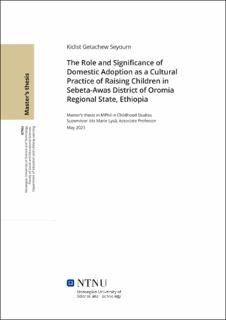| dc.description.abstract | Denne avhandlingen undersøker praksisen med innenlandsadopsjon i Sabata-regionen i Etiopia, med fokus på kulturdynamikkene som involverer adoptivforeldre, Ministeriet for kvinner, barn og ungdom, rettssystemet og midlertidige oppholdssteder for forlatte barn. Å adoptere et barn nasjonalt er en kompleks og mangefasettert prosess som involverer flere interessenter og kulturelle hensyn. Ved å undersøke rollene og samspillet til disse nøkkelaktørene, har denne forskningen som mål å belyse dynamikken og praksisene knyttet til innenlandsadopsjon i Sabata-regionen.
Studien bruker etnografiske og kvalitative forskningsmetoder, og anvender deltakende observasjon, intervjuer med sentrale informanter og fokusgruppediskusjoner med adoptivforeldre, representanter fra Ministeriet for kvinner, barn og ungdom, rettsmyndigheter og ansatte ved midlertidige oppholdssteder for forlatte barn. Disse intervjuene blir supplert med en grundig gjennomgang av relevant litteratur, politiske dokumenter og juridiske rammer som styrer adopsjonspraksis i regionen.
Forskningens funn avdekker motivasjonene, erfaringene og forventningene til adoptivforeldre gjennom hele adopsjonsprosessen. Den utforsker faktorene som påvirker deres beslutning om å adoptere nasjonalt og undersøker innvirkningen av kulturelle normer, sosialt press og juridiske hensyn på deres reise mot foreldreskap. Videre undersøker studien Ministeriet for kvinner, barn og ungdoms rolle i å legge til rette for adopsjonsprosessen, inkludert deres politikk, prosedyrer og støttetjenester som tilbys adoptivforeldre og midlertidige oppholdssteder.
I tillegg undersøker forskningen de rettslige aspektene ved innenlandsadopsjon, analyserer rollen til rettssystemet i regionen kalt Mana Murtii Aanaa Magaala Sabbataa (distriktsdomstolen i Sabata by).
Til slutt utforsker avhandlingen betydningen av midlertidige oppholdssteder for forlatte barn i Sabata-regionen kalt Tursistu Daimani, og undersøker deres rolle i å gi omsorg, støtte og sosialiseringsmuligheter for barn som venter på adopsjon.
Ved å tilby en helhetlig forståelse av praksisen med innenlandsadopsjon i Sabata-regionen, bidrar denne forskningen til eksisterende litteratur om adopsjon og gir verdifulle innsikter for beslutningstakere, fagfolk og interessenter som er involvert i adopsjonsprosessen. Funnene fra denne studien har som mål å informere fremtidig utvikling av politikk, forbedre adopsjonspraksis og til slutt styrke trivselen til barn og familier som er involvert i innenlandsadopsjon i Sabata-regionen. | |
| dc.description.abstract | This thesis investigates the practice of domestic adoption in the Sabata region in Ethiopia, focusing on the cultural dynamics involving adopting parents, the Ministry of Women, Children and Youth, the court system, and temporary residences for abandoned children. Adopting a child domestically is a complex and multifaceted process that involves numerous stakeholders and cultural considerations. By examining the roles and interactions of these key actors, this research aims to shed light on the dynamics and practices of domestic adoption in the Sabata region.
The study uses ethnographic and qualitative research methods applying Participant observation, key informant interviews and focus group discussion with adopting parents, representatives from the Ministry of Women, Children and Youth, court officials, and staff members of temporary residences for abandoned children. These interviews are supplemented with a comprehensive review of relevant literature, policy documents, and legal frameworks governing adoption practices in the region.
The research findings reveal the motivations, experiences, and expectations of adopting parents throughout the adoption process. It explores the factors that influence their decision to adopt domestically and examines the impact of cultural norms, social pressures, and legal considerations on their journey to parenthood. Furthermore, the study investigates the role of the Ministry of Women, Children and Youth in facilitating the adoption process, including their policies, procedures, and support services provided to adopting parents and temporary residences.
Additionally, the research examines the judicial aspects of domestic adoption, analysing the role of the court system of the region called Mana Murtii Aanaa Magaala Sabbataa(District Court of the City of Sabata).
Lastly, the thesis explores the significance of temporary residences for abandoned children in the Sabata region called Tursistu Daimani, examining their role in providing care, support, and socialization opportunities for children awaiting adoption.
By offering a comprehensive understanding of the practice of domestic adoption in the Sabata region, this research contributes to the existing literature on adoption and provides valuable insights for policymakers, practitioners, and stakeholders involved in the adoption process. The findings of this study aim to inform future policy development, improve adoption practices, and ultimately enhance the well-being of children and families involved in domestic adoption within the Sabata region. | |
